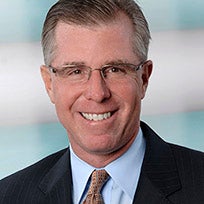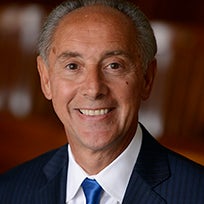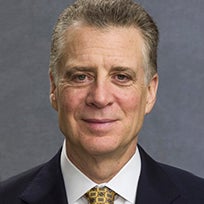
Subscribe to Pittwire Today
Get the most interesting and important stories from the University of Pittsburgh.Pitt’s Board of Trustees Names New Chair, Pays Tribute to Outgoing Leaders
At today’s annual meeting of its Board of Trustees, the University of Pittsburgh paid tribute to two leaders who have made long-lasting contributions to strengthen the institution.
Chancellor Patrick Gallagher also told board members, who convened online due to the pandemic, that—in this era of a public health crisis and a global movement to fight social injustice—“Pitt’s mission has never been more important.”
There were resolutions of appreciation on behalf of Eva Tansky Blum, the outgoing chair and highly accomplished alumna, and Arthur S. Levine, outgoing senior vice chancellor for the health sciences and dean of the School of Medicine.
In other business, the board approved Thomas E. Richards, a long-serving trustee and alumnus, as chairman of the board for a one-year term through June 2021 and elected three new board members: John Gismondi, Lisa Golden and Arthur Rooney II. Richards announced the formation of an ad hoc committee, chaired by trustee Dawne Hickton, to consider the University’s investments in fossil fuels.
Thanking a true leader
In his remarks, Gallagher said that Pitt is well-positioned to face today’s challenges because of Blum’s leadership during her five years as chair. During that time, he said, Pitt has become more strategic, with improvements in University governance, and the board itself has become more diverse and transparent with more trustee participation. He mentioned Pitt’s reshaping of its financial aid in many important ways and its leadership in community engagement, the expansion of its global footprint, as well as how it has grown the size and scale of its research activities.
“We’ve become an innovation powerhouse, a real player in creating economic opportunity. We are a sleeping giant no more,” he said.
Gallagher said the strengths of Blum’s service to Pitt are widely apparent. The trustees cited her leadership in the board’s action on creating the School of Computing and Information and expanding Pitt’s commitment to sustainability, among many other achievements.
Blum thanked the Pitt administrators and trustees for all of their hard work. “When there’s a spotlight on Pitt’s accomplishments, the city and the region shine with us,” she said.
Lasting contributions to health science
The board also thanked Levine for his 22 years of visionary leadership, during which he established several new academic and clinical departments; spearheaded interdisciplinary collaboration that led to the establishment of the Brain Institute, Center for Vaccine Research, and Institute for Precision Medicine, among others; and cemented Pitt’s reputation as a research powerhouse, with National Institutes of Health funding tripling under his watch.
Ensuring safety, maximizing a mission
Regarding the impact of the pandemic on the University, Gallagher said its new steering committee is managing hundreds of different planning activities. The focus is on key principles of increasing the safety of the community while maximizing educational offerings, research and service missions; responsiveness and making the planning adjustable; and basing plans on the very best health and science information through guidance from the Healthcare Advisory Group.
“This crisis is bigger than the University,” he said. “We will be impacted by changes in external conditions.”
Gallagher said communication is key and so is education. “We will all have to learn new things—whether it’s learning how to work from home, learning how to work safely in a campus environment, or learning how to use these new approaches which are designed to give us resiliency.”
Race and social justice
Commenting on the movement for social justice that is sweeping the globe, Gallagher said Pitt must live up to the demand for change. From an institutional perspective, he said, the Pitt community deals with the systems, powers, authorities and processes that can sustain racism and bias in our society. He said Pitt seeks to be a more just, inclusive and representational place.
“We have to move deliberately as an institution to seek out factors that support or cause underrepresentation, non-inclusivity, injustice or inequality and seek to change those,” he said. “We have to take this civic call to action and turn it into the kind of lasting and durable moral imperative—a core value of the University that shapes what we strive for, what we pay for, what we measure, and how we will define success for ourselves.”
Gallagher asked that board members fully and visibly support Pitt’s effort and to hold it accountable for results.
Overall, while these two global scenarios continue to unfold, the Chancellor said we all have to get more comfortable with uncertainty and tap into our spirit of innovation. He encouraged students, faculty, staff, alumni, the trustees and community stakeholders to collaborate and to put their work in the context of the impact Pitt could have on the region and on society.
A closer look at fossil fuel investments
New board Chair Richards closed the meeting with the announcement of the new ad hoc committee whose members will take a closer look at Pitt’s investments relating to fossil fuels. This follows up on the passage of the resolution adopting a Socially Responsible Investing Screening Process that was approved at the Board’s Feb. 29, 2020, meeting.
“We believe the issue of the University’s investments in fossil fuels has reached the threshold described in the process and requires more analysis and consideration,” he said.
New Faces on the Board
Trustees today elected the following new board members:
New Board Chair Thomas E. Richards (A&S ’76) received his bachelor’s degree in economics from the Kenneth P. Dietrich School of Arts and Sciences. He is the retired executive chairman of the board of directors, chairman, president and chief executive officer of CDW. He has more than 40 years of experience in the technology industry. During his tenure leading CDW, he oversaw significant growths in revenue Fortune 500 rankings and market capitalization. Richards was voted among Glassdoor’s Highest Rated CEOs – Employee’s Choice for three consecutive years (2015, 2016 and 2017).
Previously, Richards served in executive leadership positions at Qwest Communications, Clear Communications and Ameritech. He worked for more than 19 years in sales, marketing and telecommunications, as well as computer service operations roles at Bell Atlantic.
While at Pitt, Richards was a four-year starter on the Pitt men’s basketball team, a member of the 1973-1974 Elite Eight team and finished his career as 11th on the all-time scoring list.
Richards was elected to serve on the University of Pittsburgh Board of Trustees in 2011 and was elected to serve as board chairperson-elect in June 2019. He has served on a number of board committees, including the Risk and Compliance Committee, which he chaired from 2013 until 2018. Richards also was a member of the School of Information Sciences Board of Visitors.
In 2007, Richards was honored with the Pitt Varsity Letter Club Award of Distinction. He is a member of the Pittsburgh Basketball Club Hall of Fame and is a recipient of the University’s 225th Anniversary Medallion.
Today, Richards said: “I am inspired by the quality, the integrity and the passion of the people who serve on this board, and I assure you that will be a strong motivation as we move forward together.”
John Gismondi (A&S ’75, LAW ’78) is the founder of Gismondi and Associates. He graduated magna cum laude from the Kenneth P. Dietrich School of Arts and Sciences and from Pitt’s School of Law, where he was a member of the Law Review. He began his career as a law clerk before entering private practice focused on personal injury litigation.
Gismondi has received the highest rating for legal ability, diligence and honesty from the nation’s most recognized reference, and The Legal Intelligencer honored him with its Lifetime Achievement Award. Gismondi has served as president of the Allegheny County Bar Association and of the Academy of Trial Lawyers and is an invited member of the American College of Trial Lawyers.
With his support, Pitt Law established the John P. Gismondi Civil Litigation Certificate Program in 2003 to train law students as courtroom attorneys. Gismondi and his wife Lisa created the Gismondi Family Foundation which provides grants to Pittsburgh nonprofit organizations. The foundation and the University recently launched PittEnrich, a tutoring and enrichment program for Pittsburgh grade schoolers. In 2008, Pitt Law named Gismondi a distinguished alumnus; in 2012, the University named him a Legacy Laureate. He resides in Pittsburgh with his wife, two daughters and son.
Lisa Golden (A&S ’93) graduated magna cum laude and Phi Beta Kappa in neuroscience from the Dietrich School of Arts and Sciences. She is currently an emergency medicine physician at UPMC Altoona. Prior to this role, she provided emergency services in a variety of clinical settings in Western Pennsylvania and North Carolina, and served as a physician advisor for Executive Health Resources and co-founder of WPA Emergency Medicine Staffing, LLC.
Golden is the immediate past president of the Pitt Alumni Association; her background in team building helped lead the alumni association through a period of restructuring and to build a guiding coalition of board members to ensure success. She became a director-at-large on the board in 2009 and served as chair of the scholarship committee, member of the executive committee, community representative of the Board of Trustees Institutional Advancement Committee and a mentor to Pitt students and alumni.
Golden actively participates in student and resident education and serves as a co-chair for the Altoona Hospital Foundation’s Winter Splendor fundraiser. She is an avid Pitt Panthers fan and resides in Windber, Pennsylvania.
Art Rooney II (A&S ’78) received a bachelor’s degree in political science from the Dietrich School of Arts and Sciences. Rooney was named president of the Pittsburgh Steelers in May 2003. He currently serves as chairman of the NFL’s Stadium Workplace Diversity Committee, as well as chair of the NFL Compensation Committee. Additionally, he serves on numerous NFL committees, including the Legislative Committee, Management Council Executive Committee, International Committee, Health and Safety Advisory Committee, Digital Media Committee and the NFL Foundation.
Rooney is also very active in the Pittsburgh community, serving on the boards of the Pittsburgh Public Theater, Saint Vincent College, the Senator John Heinz History Center and the United Way of Allegheny County.





